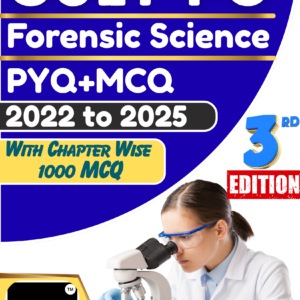
How to prepare for CUET PG Forensic Science Exam Complete Guide
The CUET PG Forensic Science exam is your gateway to some of the most prestigious universities in India. With the growing demand for forensic experts in law enforcement, research, and academia, cracking this exam can set you on a promising career path.
But how do you prepare smartly for a paper that demands both deep subject knowledge and quick problem-solving skills? Let’s break it down step by step.
Table of Contents
📌 1. Exam Pattern: Know What You’re Facing
Unlike some CUET PG papers that include aptitude sections, Forensic Science has a single subject-specific paper.
- Mode: Computer-Based Test (CBT)
- Total Questions: 75 (MCQs)
- Total Marks: 300 (4 marks per correct, –1 for incorrect)
- Duration: 105 minutes
- Nature of Paper: Only Forensic Science topics, UG-level
👉 This means 100% of your preparation should be focused on subject mastery — no need to spend time on reasoning, English, or GK.
📌 2. Syllabus Breakdown: What to Study
The syllabus is based on core areas of Forensic Science taught at B.Sc. level. Here’s the big picture:
🔬 Forensic Biology & Serology
- Blood, semen, saliva, urine, sweat analysis
- Hair, fibers, pollen, plant & animal evidence
- DNA profiling, PCR, electrophoresis
⚗️ Forensic Chemistry & Toxicology
- Poisons, drugs, narcotics, alcohol detection
- Chromatography & spectroscopy in analysis
- Toxicological symptoms & medico-legal importance
🔫 Forensic Physics & Ballistics
- Firearms, bullets, cartridges, gunshot residues
- Glass, paint, soil, tool marks
- Physics in crime scene investigation
⚕️ Forensic Medicine
- Autopsy & post-mortem changes
- Wounds, asphyxia, burns, drowning
- Medico-legal cases: sexual offenses, death investigation
🕵️ Criminalistics & Questioned Documents
- Fingerprints, footprints, tire marks, impressions
- Handwriting, forgery, counterfeit notes
- Paper, ink, and signature analysis
💻 Digital & Cyber Forensics
- Cybercrime basics, digital evidence
- Data recovery & cyber laws
- Ethical and legal considerations
🧠 Forensic Psychology
- Polygraph, narco-analysis, brain mapping
- Offender profiling, psychology of crime
📜 Laws & Forensic Science
- Indian Penal Code (IPC)
- Code of Criminal Procedure (CrPC)
- Indian Evidence Act, expert witness role
📌 3. Recommended Books & Resources
📚 Standard Textbooks
- Textbook of Forensic Medicine & Toxicology – R.S. Modi
- Forensic Science in Criminal Investigation & Trials – B.R. Sharma
- Criminalistics: An Introduction to Forensic Science – Richard Saferstein
- Forensic Medicine & Toxicology – Karmakar
- Essentials of Forensic Science – Nabar
📝 Practice Material
- CUET PG sample/mock papers
- UGC NET Forensic Science question papers (useful overlap)
- Online test series for time management
Recommended Book PYQ + MCQ Just Rs 360-/
-
CUET-PG Forensic Science Previous Year Solved Question Paper With Chapter Wise 1000 Question With Solution As Per Updated Syllabus
Original price was: ₹500.00.₹499.00Current price is: ₹499.00.
📌 4. Preparation Strategy
🎯 Step 1: Build a Strong Foundation
- Revise all your UG-level notes.
- Make concise notes of important definitions, laws, and procedures.
- Focus on high-yield areas like DNA analysis, toxicology, ballistics, and fingerprints.
🎯 Step 2: Organize by Priority
- High weightage: Forensic Biology, Toxicology, Fingerprints, Laws
- Medium weightage: Ballistics, Forensic Medicine, Cyber Forensics
- Low but scoring: Documents, Trace evidence (glass, paint, soil)
🎯 Step 3: Practice Aggressively
- Solve at least 30–40 MCQs daily from the topic you’ve studied.
- Take weekly mock tests to identify weak spots.
- Learn to eliminate wrong options to avoid negative marking.
🎯 Step 4: Revision Strategy
- Dedicate the last month purely to revision + mock tests.
- Revise short notes daily.
- Highlight quick facts (poison symptoms, fingerprint types, sections of IPC/CrPC).
📌 5. Three-Month Study Plan
Month 1
- Forensic Biology, Serology, Forensic Medicine
- Daily MCQs practice + 1 weekly mini test
Month 2
- Toxicology, Ballistics, Documents, Cyber Forensics
- Start full-length mocks (1–2 per week)
Month 3
- Intensive revision of all topics
- Focus on weak areas identified in mocks
- Take 8–10 full-length mock tests before exam day
📌 6. Last-Minute Tips
✅ Attempt easy questions first – secure quick marks before tackling tough ones.
✅ Don’t over-attempt — negative marking can pull down scores.
✅ Revise case studies and real-world forensic applications.
✅ Stay calm, well-rested, and confident.
🎯 Conclusion
The CUET PG Forensic Science exam may look challenging, but remember — it’s only one subject-focused paper with 75 questions. If you master your UG-level Forensic Science syllabus, practice MCQs, and revise smartly, you can easily secure a top rank.
Consistency, smart planning, and revision are your three weapons to crack this exam.

